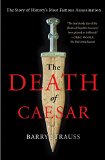Summary | Excerpt | Reviews | Beyond the Book | Read-Alikes | Genres & Themes | Author Bio

Critics' Opinion:
Readers' Opinion:
First Published:
Mar 2015, 352 pages
Paperback:
Mar 2016, 352 pages
 Book Reviewed by:
Book Reviewed by:
Kim Kovacs
Buy This Book
This article relates to The Death of Caesar
In The Death of Caesar, author Barry Strauss touches on the lives of some of the women surrounding the conspirators, including Brutus's wife Porcia Catonis, the daughter of Brutus's uncle Cato the Younger, and perhaps, the only woman who knew about the conspiracy to assassinate Caesar.
Much of Porcia's life is undocumented. It's believed she was born some time between 73 BCE and 64 BCE, and that Cato divorced her mother for adultery when Porcia was very young. She was married to her first husband, the conservative Marcus Calpurnius Bibulus, sometime between 58 BCE and 53 BCE, and it's thought she may have borne Bibulus a son named Lucius, although this is debated.
Porcia is rumored to have been very beautiful. Plutarch claims a famous orator, Quintus Hortensius, tried to bribe Bibulus into giving her to him, even offering to return her after she'd produced an heir for him (an arrangement that wasn't at all unusual at the time). Bibulus refused, but Cato had the final word; he also turned Hortensius down – and instead gave the man his own wife.
Both Cato and Bibulus supported Pompey against Julius Caesar during the Roman Civil War, as did Porcia's brother Marcus Cato and her cousin, Brutus. Bibulus was killed in battle in 48 BCE, and Cato committed suicide in 46 BCE following his defeat in the battle of Thapsus. Following Cato's death Brutus abruptly divorced his wife Claudia to marry Porcia, an act that caused a scandal and was very unpopular with many, in particular Brutus's mother Servilia. Although Servilia was Cato's half-sister, she supposedly despised him and consequently resented his daughter's influence on her son.
 Plutarch states that Porcia was aware about the assassination conspiracy — seeing that Brutus had something on his mind, she suspected the truth. When she confronted him, however, he wouldn't reveal the plot and she believed it was because she was a woman and would break under torture. To prove that she could endure pain, she supposedly then stabbed herself in the thigh and allowed the wound to go untreated for a day. Once she confessed what she'd done to Brutus and told him why she'd inflicted such pain on herself, he admitted her into the circle of conspirators.
Plutarch states that Porcia was aware about the assassination conspiracy — seeing that Brutus had something on his mind, she suspected the truth. When she confronted him, however, he wouldn't reveal the plot and she believed it was because she was a woman and would break under torture. To prove that she could endure pain, she supposedly then stabbed herself in the thigh and allowed the wound to go untreated for a day. Once she confessed what she'd done to Brutus and told him why she'd inflicted such pain on herself, he admitted her into the circle of conspirators.
Porcia remained in Rome after the murder, as her husband and his fellow plotters fled the city. Plutarch claims she was stoic until seeing a painting of The Illiad's Hector parting for the last time from his wife Andromache, at which point she was overcome with grief, believing she'd never see Brutus again.
The circumstances surrounding her death have been debated for centuries. Plutarch claimed that upon believing Brutus was dead she committed suicide by swallowing live coals. Historians have cast doubt that this could be accomplished, and claim instead that she sat in an enclosed room with burning coals, thereby dying of carbon monoxide poisoning. Certain correspondence from the time period also seems to hint of her death from an illness. The timing is uncertain; some historians claim she killed herself after hearing of Brutus's death following the second battle of Philippi, but some believe she mistakenly heard he'd died in the first battle of Philippi and committed suicide at that point.
Picture of Porcia wounding her thigh by Elisabetta Sirani
Filed under People, Eras & Events
![]() This "beyond the book article" relates to The Death of Caesar. It originally ran in April 2015 and has been updated for the
March 2016 paperback edition.
Go to magazine.
This "beyond the book article" relates to The Death of Caesar. It originally ran in April 2015 and has been updated for the
March 2016 paperback edition.
Go to magazine.





The House on Biscayne Bay
by Chanel Cleeton
As death stalks a gothic mansion in Miami, the lives of two women intertwine as the past and present collide.

The Flower Sisters
by Michelle Collins Anderson
From the new Fannie Flagg of the Ozarks, a richly-woven story of family, forgiveness, and reinvention.

The Funeral Cryer by Wenyan Lu
Debut novelist Wenyan Lu brings us this witty yet profound story about one woman's midlife reawakening in contemporary rural China.
Your guide toexceptional books
BookBrowse seeks out and recommends the best in contemporary fiction and nonfiction—books that not only engage and entertain but also deepen our understanding of ourselves and the world around us.